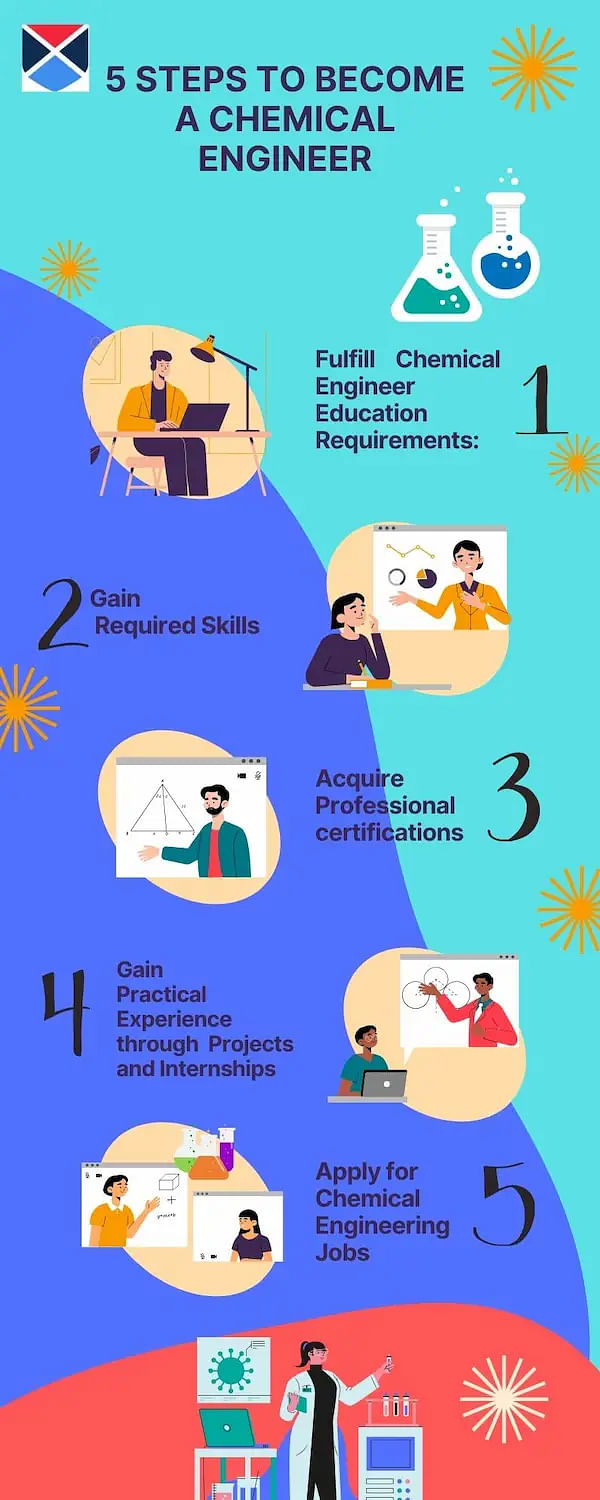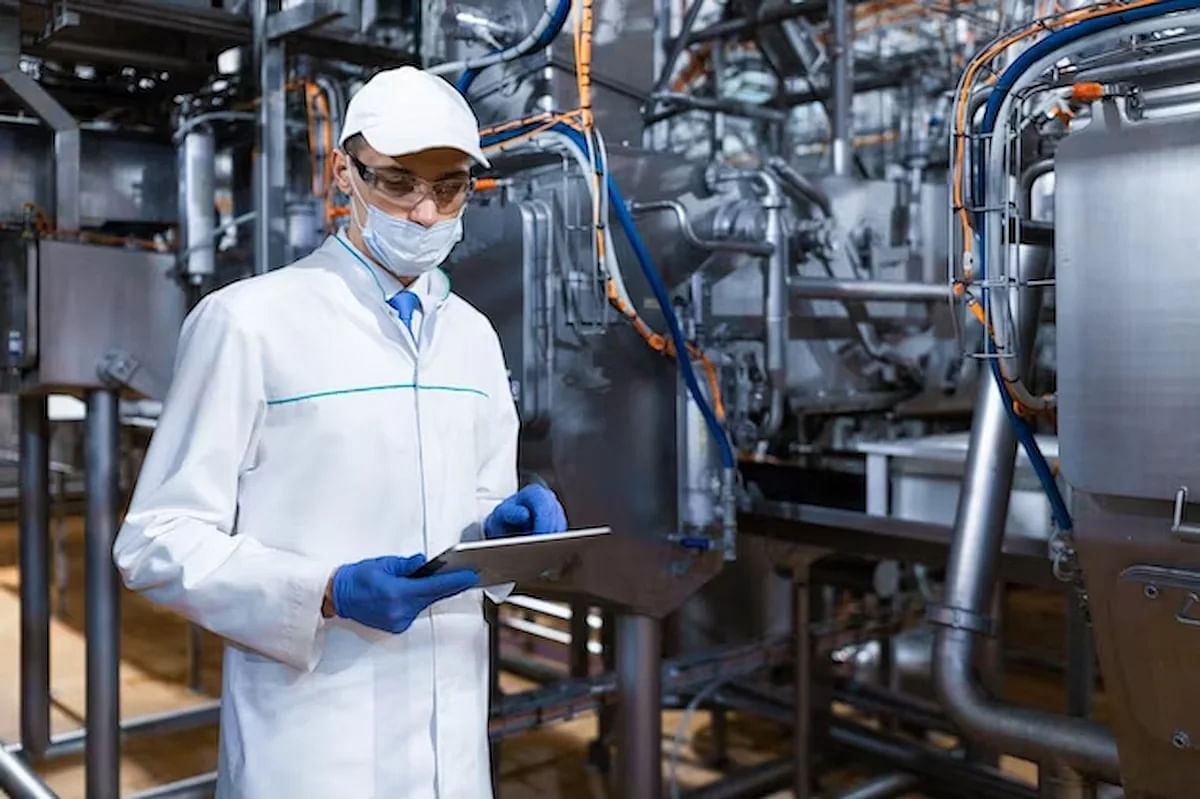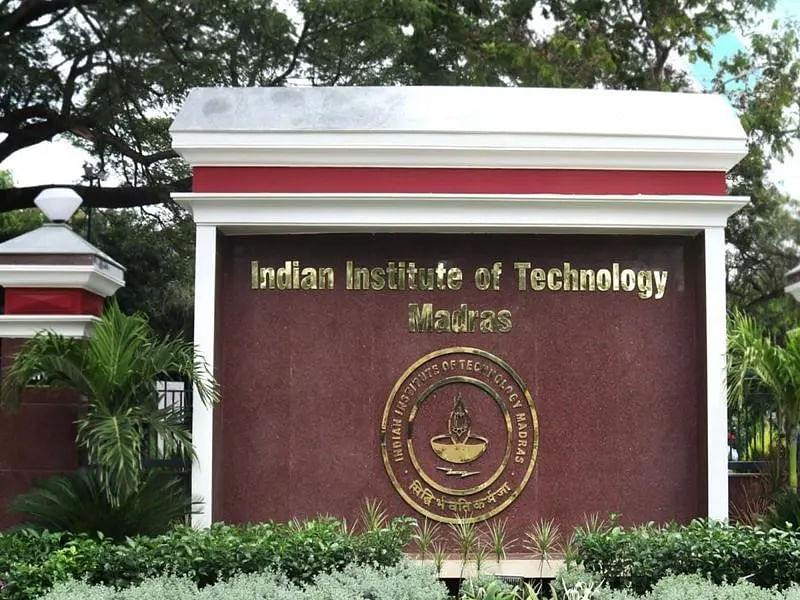Is becoming a Chemical Engineer your dream career option? Check out the complete step by step process on how to become a Chemical Engineer, Eligibility, Exams, Skills Required and Salary in 2024.
How to Become a Chemical Engineer in India? To become a chemical engineer in India, the candidate must complete either a BE or BTech in Chemical Engineering, enhance the required skill set such as design skills, analytical thinking, mathematical skills, etc, apply for internships, and take personal projects to gain hands-on experience.
The Chemical Engineers' job outlook is projected to grow at the rate of 8% between the year 2022-2032 with an average annual growth of 20,800 jobs per year. Chemical engineers are professionals who use the concepts of chemistry such as organic, inorganic, biochemistry etc to innovate and manufacture various compounds or products by being involved in processes such as designing, manufacturing, testing, etc.
Chemical Engineers are employed in various industries such as manufacturing, healthcare, cosmetics, pharmaceutical, etc. The average Chemical Engineer salary in India ranges between INR 1.4 - 9.4 LPA and the salary range can go up to INR 20 LPA with 5-10 years of work experience. (Source: AmbitionBox)
Table of Contents
- How to Become a Chemical Engineer?
- Who is a Chemical Engineer?
- What Does a Chemical Engineer Do?
- How Long Does it Take to Become a Chemical Engineer?
- Types of Chemical Engineers
- Skills Required to Become a Chemical Engineer
- Chemical Engineer Salary in India
- Benefits of Becoming a Chemical Engineer
How to Become a Chemical Engineer?
Candidates who have an interest in the field of chemistry, innovation and technology can opt to become a Chemical Engineer in India. Here is the step-by-step guide on how to become a Chemical Engineer.
- Step 1: Fulfill Chemical Engineer Education Requirements
- Step 2: Gain Required Skills
- Step 3: Acquire Professional Certifications
- Step 4: Gain Practical Experience Through Internships and Projects
- Step 5: Apply for Chemical Engineer

Step 1: Fulfill Chemical Engineer Education Requirements
The first and foremost step to becoming a Chemical Engineer is to choose the right stream during class 12 to fulfil the eligibility requirements for a bachelor’s degree. The candidate must have completed 10+2 with atleast 50% marks with Physics, Chemistry and Mathematics as a mainstream subject from any recognised board to be eligible for the admission process.
Listed below are some of the courses that the candidates can opt for to become a Chemical Engineer in India:
Undergraduate Courses
Candidates can begin by enrolling in an undergraduate course with a specialisation in Chemistry from any recognised university. Listed below are the undergraduate courses students can opt for to become a Chemical Engineer:
|
Courses |
Duration |
Top Colleges |
|
4 Years |
IIT Madras, IIT Delhi, IIT Kanpur |
|
|
4 Years |
Institute of Chemical Technology Mumbai, Delhi Technological University, IIT Madras |
|
|
4 Years |
Laxminarayan Institute of Technology Aligarh Muslim University, MIT-WPU Faculty of Engineering |
|
|
BE Materials Engineering |
4 Years |
BHU, Loyola College, Christ University |
|
BTech Biochemical Engineering |
4 Years |
IIT Mumbai, Jadavpur University, Andhra University |
|
BSc Chemical Engineering |
3 Years |
Parul University, Christ University, Sharda University |
Read More: Chemical Engineering Courses after 12th
Postgraduate Courses
To enhance the knowledge further and for better career prospects, candidates can opt for postgraduate courses in chemical engineering. Listed below are some of the courses for chemical engineers after graduation:
|
PG Courses |
Entrance Exams |
Top Colleges |
|
JEE Main, OJEE, KLEEE |
IIT Mumbai, BITS Pilani, IIT Kharagpur |
|
|
BHU PET, JNUEE, DUET, IPU CET |
Delhi University, Aligarh Muslim University, BHU |
|
|
ME Chemical Engineering |
JEE Main, MHT CET, WBJEE, |
IIT Madras, IIT Delhi, IIT Bombay |
|
MA Chemistry |
NEST, DUET, CUET PG |
LPU, JMI, Christ University |
Also, Check: NIRF Engineering Ranking 2023: Best Engineering Colleges in India
Step 2: Gain Required Skills
To become a successful chemical engineer in India, a candidate must develop computer skills, soft skills, and technical skills such as analytical thinking, attention to detail, mathematical skills, computer literacy, etc. Listed below are some of the key skills to become a chemical engineer:
- Technical Skills: Chemical Engineers must demonstrate a diverse set of technical skills from knowing the concepts of fluid dynamics, thermodynamics, designing, and optimisation principles as the job role involves multi-tasking from planning to product demonstration and output
- Computer Skills: With evolving trends and technologies, candidates aspiring to become a chemical engineer must develop computer skills in using various software packages and tools for designing, analysing, optimisation and visualization.
- Soft Skills: For any career, candidates need to develop and demonstrate soft skills such as critical thinking, time management, problem-solving, attention to detail, etc to excel in their career for chemical engineers these are highly important to deliver the right outcome and to troubleshoot any issues that may arise.
Step 3: Acquire Professional Certifications
Once the candidate acquires the required skill set and education, they must consider applying for Fundamentals of Engineering (FE) and Professional Engineers (PE) certifications as most employers require licenses when the candidate is being recruited for high-level designations. This is highly beneficial for candidates who are willing to practice in abroad countries upon graduation.
Listed below are the important details about the FE and PE certifications:
- Fundamental of Engineering Exam: Candidates who have graduated with a 4-year engineering degree or pursuing the final year can apply for the FE exam. FE certification is also referred to as EIT certification (Engineering-in-Training) as it indicates to the employers that the candidate is halfway through the process of acquiring a PE certification.
- Professional Engineering Exam: The main requirement to apply for the PE license or certification is that the candidate must have completed BE or BTech in chemical engineering from an accredited university and have atleast 5 years of professional experience. This certification will allow the candidate to work on various projects, consultation, research and development areas, etc.
Step 4: Gain Practical Experience Through Internships and Projects
The next step towards becoming a Chemical Engineer is to apply for internships and work on personal projects. As a chemical engineer intern, candidates will be involved in roles and responsibilities such as building and designing computer-aided models for projects, researching, experimenting and evaluating the performances of various chemical components and getting involved in the testing and manufacturing processes.
Undertaking personal projects by connecting with peers on social networking sites will enable the candidate to build a strong portfolio. By doing an internship, the candidate will be able to gain hands-on experience and can create a competitive edge while applying for jobs.
Also, Check: Career Objectives for Engineers with Examples to Include in Resume
Step 5: Apply for Chemical Engineering Jobs
The final step to becoming a chemical engineer is to apply for entry-level chemical engineering jobs such as Quality Engineer, Process Engineer, Design Engineer, Environmental Engineer, etc. Chemical Engineers are recruited by various sectors starting from pharmaceuticals to cosmetics.
The average entry-level Chemical Engineer salary ranges from INR 5 LPA and the chemical engineer's starting salary per month ranges from INR 19,000. Listed below are some of the chemical engineers entry level job designation and their salary details:
|
Job Role |
Average Entry-Level Salary |
|
Chemical Analyst |
INR 2.4 LPA |
|
Production Engineer |
INR 3.5 LPA |
|
Quality Engineer |
INR 3.4 LPA |
|
Process Engineer |
INR 5.9 LPA |
|
Research and Development Engineer |
INR 7.2 LPA |
Who is a Chemical Engineer?
Chemical Engineers are professionals who use mathematical and chemical concepts to design and manufacture products and materials by applying various economic and technical processes. They are also involved in the development, research, manufacturing and testing of various products ranging from food, cosmetics, medicine, etc.
Chemical Engineers play an important role in many industries such as environmental engineering, pharmaceutical, cosmetics, food processing, food manufacturing, international exports, logistics, etc. They are involved in troubleshooting problems related to manufacturing, storage, testing, etc. in an organisation.
What Does a Chemical Engineer Do?
The role of a Chemical Engineer in an organisation is enormous starting from research and development to final product demonstration based on the designation and the type of industry they work with. Listed below are some of the Chemical Engineer job responsibilities:
- Chemical Engineers are responsible for the designing and development of any product or material using chemical formulas and concepts as per the client’s requirements.
- Responsible for testing and troubleshooting any issues during the manufacturing process.
- Implementation and maintenance of safety protocols to avoid any health hazard to the environment.
- Optimising the performance of the current products to reduce the load and impact on the environment.
- Collaboration with teammates to innovate new technologies and ideas to improve the efficiency and reliability of the products
- Addressing environmental and economic concerns towards chemical concerns and innovating alternative solutions.
How Long Does it Take to Become a Chemical Engineer?
It takes around 4 years to become a Chemical Engineer in India as the process involves graduating with a bachelor’s degree and applying for an internship to gain experience and hands-on skills before landing a job as a chemical engineer. Some candidates take an additional two years to complete their master’s degree to enhance their knowledge further and for better career progression.
Candidates planning a career as a chemical engineer in abroad might take an additional 5 years as most foreign employers demand a PE License and professional work experience.
Also, Check: How to become a Software Engineer?
Types of Chemical Engineers
Chemical Engineers are employed in various industries and their designation and specialisation varies according to the industry they work in. Below are some of the types of Chemical Engineers in India:
1. Material Engineers
Material Engineers specialise in designing and developing specific materials for the manufacturing processes such as ceramic, silicone, plastic, etc. They are generally employed in manufacturing industries, factories, automobiles, etc.
2. Food Processing Engineers
Food Processing Engineers specialise in testing and overseeing the food processing process and are involved in the production and storage of food products. They are generally employed in the food processing industry, hotels, logistics companies, export companies, etc
3. Quality Engineer
Quality Engineers are responsible for ensuring that the products made are as per the industry standards and follow the protocol of safety hazard and management by carrying out various testing, inspection and analysis processes.
4. Pharmaceutical Engineer
Pharmaceutical Engineers specialise in developing and manufacturing products related to pharmaceutical science right from packaging materials, syringes, medical instruments, storage materials, etc.
5. Polymer Engineers
Polymer Engineers are professionals who specialise in designing, developing, testing and analysing polymer and polymer-based products for factories and manufacturing units.
6. Process Engineers
Process Engineers are responsible for overseeing the complete design, operation, testing, inspection, production, manufacturing, and optimisation of any chemical compound or product.
7. Nuclear Engineers
Nuclear Engineers are responsible for designing and developing systems or processes that are used in nuclear power stations, power plants, etc. They are mostly employed in power generation units, power plants, etc.
Skills Required for Chemical Engineers
Candidates must have a combination of technical, computer and soft skills to become a successful chemical engineer in India. Given below is the detailed list of skills required for chemical engineers:
Technical Skills
Chemical Engineers are required to demonstrate technical skills such as Quality Control, Economic Analysis, Observation Skills, Mathematical and Analytical skills, etc. Listed below are some of the important technical skills required to become a chemical engineer in India:
- Mathematical Skills
- Fluid Mechanics and Heat Transfer
- Understanding of the Chemical Process
- Material Science
- Process Control
- Separation Processes
Computer Skills
Candidates aspiring to become Chemical Engineers must also demonstrate computer skills such as designing, documentation, visualization, reporting, etc using software and tools. Listed below are some of the computer skills required to become a chemical engineer:
- Process Simulation Software
- Mathematical Modeling and Analysis
- Computer Aided Designing
- Process Control Software
- Statistical Analysis Tools
- Computational Fluid Dynamics
- Process Visualization Tools
- Laboratory Information Management Systems
- Finite Element Analysis
Soft Skills
Candidates must focus on improving the following soft skills to become a successful chemical engineer:
- Communication Skills
- Problem-Solving Skills
- Time Management Skills
- Teamwork
- Project Management Skills
- Observation Skills
- Analytical Thinking
- Attention to Detail
Chemical Engineer Salary in India
The average Chemical Engineer salary ranges from INR 1.4 to 9.4 LPA based on the domain knowledge and expertise and the salary range can go up to INR 18 LPA with 3-5 years of work experience. Listed below is the chemical engineer salary for various job designations:
|
Chemical Engineer Job Role |
Average Salary |
Salary after 3+ Years of Experience |
|
Quality Assurance Engineer |
INR 6.8 LPA |
INR 11 LPA |
|
Polymer Engineer |
INR 4.4 LPA |
INR 8.5 LPA |
|
Food Safety Engineer |
INR 4.7 LPA |
INR 7.5 LPA |
|
Product Engineer |
INR 8 LPA |
INR 14.5 LPA |
|
Thermo Fluid Engineer |
INR 4.5 LPA |
INR 17.1 LPA |
|
Pharmaceutical Engineer |
INR 3.2 LPA |
INR 10.1 LPA |
Also, Check: List of Government Jobs For Engineers in India
Key Areas of Recruitment for Chemical Engineers
Chemical Engineers have great scope in various industries ranging from pharmaceutical to sales and marketing. Listed below are some of the key areas of recruitment for Chemical Engineers:
- Research and Development
- Production and Operations
- Project Management
- Sales and marketing
- Safety and Environmental Management
- Process Design and Development
- Equipment and Plant Design
What are the Benefits of Being a Chemical Engineer
Candidates need to understand the benefits of being a chemical engineer in India before choosing a career in the chemical industry. Here are the important benefits of being a Chemical Engineer to consider:
- Diverse Career Opportunities: There is a high scope and demand for Chemical Engineers in many industries with increasing demand for innovation and technology in every industry and awareness of environmental safety
- High Demand: Major industries in the world depend on the expertise of chemical engineers for designing, developing and manufacturing various cost-effective and nature-friendly products
- Competitive Salary: Compared to other engineering careers, a career as a chemical engineer yields a competitive salary to the candidates due it its increasing demand for the skills and expertise chemical engineers demonstrate.
- Career Progression: The field of chemical engineering is dynamic and ever-changing and thus it demands continuous learning and offers better career prospects.


















POST YOUR COMMENT